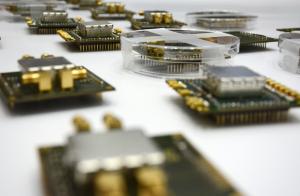Chips developed for ITER remote handling sensors
4 Feb 2016
-
European Domestic Agency, Fusion for Energy
A sample of the electronic chips stemming from the collaboration between the European Domestic Agency, Oxford Technologies, and the Katholieke Universiteit of Leuven (KU Leuven).
Collaboration between the European Domestic Agency, Oxford Technologies Ltd and the Katholieke Universiteit of Leuven (KU Leuven) has led to the development of an electronic chip for sensors that has shown promising results in a radiation environment.
Remote handling operations in ITER will rely on sensors capable of transmitting information about the many interconnected tools, manipulators and cranes responsible for maintenance and repairs. Receiving real-time data on temperature, pressure and position will be important to operating the equipment in limited space with millimetric accuracy. Other considerations for the design of these small but crucial components include exposure to radioactivity, limited space for interconnecting wire between the sensors, and the necessity of having a common "language" for sensors located in different parts of the machine.
In a five-year collaboration, engineers from the European Domestic Agency, Oxford Technologies and KU Leuven have developed an electronic chip that is able to sustain the radiation environment, and which converts analogue data picked up by sensors to a digital format and transmits the information through a single wire.
A full-fledged design of a chip using Taiwanese technology has been designed and irradiated at the SCK-CEN research centre in Belgium. The results are promising and could have an impact on the development of other electronics to be deployed in the ITER device.
Read the original story on the European Domestic Agency website.


